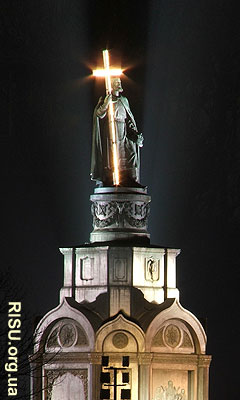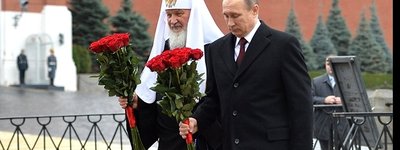Rebaptizing Rus’

 Is there something odd about celebrating the 1025th anniversary of the Baptism of Rus’? Isn’t it enough to observe bigger, “rounder” dates? Why should the Church go to the trouble of putting on a major spectacle every 25 years, when there are other anniversaries to remember?
Is there something odd about celebrating the 1025th anniversary of the Baptism of Rus’? Isn’t it enough to observe bigger, “rounder” dates? Why should the Church go to the trouble of putting on a major spectacle every 25 years, when there are other anniversaries to remember?
The answer depends on how we think of “baptism.” Some may imagine that once a people is “baptized” and formally accepts Christianity, it remains Christian forever. But that is obviously not true. Historically, for example, many Christians in the Middle East and the Balkans massively converted to Islam, often by free choice rather than force. Today, moreover, the Scandinavian countries have largely ceased to be Christian, while nations like France and Spain can no longer be regarded as Catholic. Like individual baptism, the baptism of a people is no guarantee that it will keep the faith.
In the past, of course, it could be assumed in a Christian society that parents and the surrounding community, and perhaps the school and the broader society, would bring each generation up in the Christian faith. But there are few Christian societies left. Even those who receive catechism as children and attend Catholic schools will sooner or later exercise a choice among the many competing religions and world-views that modern society offers. And if they make no choice at all, but go along with the mainstream, in many societies that mainstream is far from Christian.
Hence, if Ukrainian Christianity is to survive, every generation will have to be “baptised” anew. Since the length of a generation is approximately twenty-five years, a “rebaptism of Rus’” at quarter-century intervals is just the right formula.
Of course, today’s “rebaptism” will not consist of a mass dunking in the Dnipro. After all, even the initial Christianization of Rus’ required many decades of teaching by word and example. In our time, this cannot be limited to rote catechism or mere exhortation. It must be a profound dialogue between Church and people. This is what is meant by the “New Evangelization.”
To be sure, the “New Evangelization” heralded by the late Pope John Paul II was first of all a response to the secularization of Europe. Now, with a Latin American pope with a particular concern for the lands of the South and East, it may become a global movement. For Ukraine, Pope Francis’ new evangelization has several specific implications.
First, taking his name from Saint Francis of Assisi (1186-1226), the new pope has called for “a poor Church, and a Church of the poor.” Following his personal example, the Catholic Church can be expected to shun pomp and ceremony and focus on spiritual simplicity. It can also be expected to concern itself more fully with the plight of society’s “lowest of the low.” In Ukraine, such an approach would contrast with the personal lifestyle of some members of the clergy and hierarchy. It would call upon the faithful to address the country’s poverty, unemployment, and homelessness.
In his opening homily ofMarch 19, referring to Saint Joseph as well as to St. Francis and the Book of Genesis, Pope Francis spoke of the need to “protect” Nature and nature’s law. On the one hand, this appears to have been an indication that he would emphasize Natural Law theory in his theology. At the same time, it was a direct reference to environmental protection. For Ukraine, with its legacy of environmental destruction, this is a welcome sign.In this predominantly Orthodox nation, Pope Francis’ friendly reception of Ecumenical Patriarch Bartholomew, noted for his ecological concerns, is also significant.
Third, in modifying his episcopal coat of arms for use as a papal escutcheon, Pope Francis retained the motto “miserandoatqueeligendo,” a quotation from the Venerable Bede’s homily on the Gospel of Matthew. The phrase “having pity on, and choosing” refers to Jesus’ calling of Matthew, a tax-collector who, as such, was regarded as a public sinner, though Jesus evidently understood his inner misery. The implication seems to be that in the “church of the poor,” wealthy sinners are called to repent and become apostles too. It can even be seen as a pointed message to Ukraine’s oligarchs: one that does not condemn or reject them, but calls them to spiritual transformation.
Naturally, Ukraine’s new evangelization will encounter obstacles. First of all, according to various observers, the habit of Orwellian “doublethink,” which in the Soviet period became a feature of the entire culture, has not disappeared. In the Catholic context, it takes the form of professing Christianity and going through the motions of church attendance and sacraments while freely and openly indulging in any number of sins. The widespread giving and taking of bribes is only the most notorious example. Theft of public funds and property is another.
A related social habit, one that is equally common in the West, is selective morality and belief. One often hears people saying they “can accept” Christ’s teaching about love of the poor, but not his condemnation of adultery. In the West, most people can “agree with” the Church’s condemnation of withholding wages, but not of sodomy; in Ukraine,it appears to be the reverse. Such “a la carte” attitudes are inconsistent with the seamless garment of Christian teaching.
A third obstacle to the new evangelization in Ukraine is what is sometimes described as the “folkloric”nature of its Christianity. Patriotic Ukrainians often treat holidays as ethnographic material that must be preserved, not living celebrations of spiritual realities. This attitude, sometimes bordering on superstition, results in a superficial religiosity unconnected to faith or ethics. While popular religion can be an authentic and beneficial expression of a people’s religiosity, it must not reduce it to mere custom or ritual.
A genuine rebaptism of Rus’ cannot be an isolated event. It can only be a milepost along the road of the people’s continual spiritual growth.










